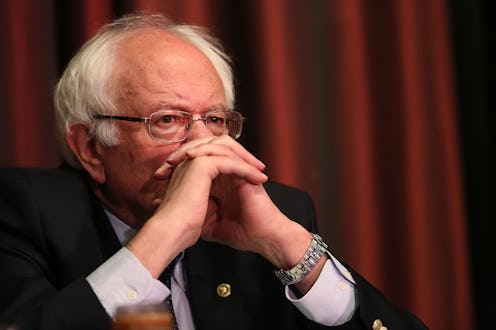News
Bernie Sanders' Options Are Dwindling
The New York presidential primary is Tuesday night, and it's shaping up to be a big day for the Democratic and Republican frontrunners. While Donald Trump is out to a nearly 30-point lead over his GOP rivals, Hillary Clinton is leading Bernie Sanders by about 13 points in the polls, at a time when the Vermont senator badly needs to close the gap. And if he doesn't have another huge upset in him, well, things will look bleaker still. Sanders is running out of non-superdelegate strategies to get the Democratic nomination, and he could soon have only some, shall we say, extremely undemocratic paths forward.
Here's the grisly reality for the Sanders campaign: Assuming he fails to upset Clinton in New York (I'm not selling his upset abilities short, but still, it doesn't look promising), that means he'll again have failed to dent her delegate lead, instead widening his deficit. And it's getting very late in the process to still be dropping states, much less states of the size and import of New York. The Democratic primaries award delegates proportionally, not in a winner-take-all fashion, which means it's hard to make up ground against a competent, resilient frontrunner.
So what does the race look like after New York? There will still be 1,668 pledged delegates up for grabs for the Democrats, with 2,383 needed (including the 712 superdelegates) to secure a majority, and thus the nomination. Sanders currently sits at 1,094 pledged delegates, compared to 1,307 for Clinton, meaning he has to make up a lot of ground over the next couple of months ― because while the superdelegates could decide to back him instead of Clinton, they've never before gone against the will of the Democratic electorate.
And that's the big point, really: So far, it's Hillary Clinton, not Bernie Sanders, who is more popular the choice for the Democratic electorate. Clinton currently leads Sanders not just in delegates and total states won, but in the raw vote too, by more than two million. So if you hear the Sanders campaign (or Sanders supporters) arguing that those terrible, democracy-thwarting superdelegates should support their guy instead, don't buy it. It's an undeniable, mathematical fact that as things stand right now, Clinton is ahead by any measure. As long as that's true, the democratic outcome is for her to claim the nomination.
And as long as that's the case, any attempt by Sanders to appeal to the superdelegates might be fair political game, but it would not reflect well on a so-called political revolution that's supposed to be fueled by voter enthusiasm and the will of the people. It'd be an attempt to usurp the Democratic nomination from the candidate that more Democrats actually wanted.
There's an obvious tension in all this. Sanders' stated plan for getting his presidential agenda passed, after all, seems to rely almost entirely on there being a massive groundswell of support for his self-evidently reasonable ideas, but that's an argument that's completely tarnished and undermined if he can't win the Democratic nomination without gaming the system.
You might disagree with the existence of superdelegates, and that's fine. But the fact is that they always end up backing the person who's leading in pledged delegates. If Sanders were, they'd support him, just like they did Obama in 2008. But he's not, so they aren't. While it remains to be seen whether Sanders and his campaign will actually press this matter as the convention gets closer, this much is clear: It's easy to condemn the superdelegates, until they're your last hope.
